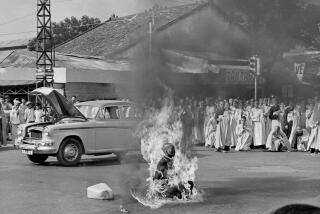Op-Ed: Restore voting rights for low-level felons in California
In the United States today, 13% of all black men are denied the right to vote because they have been convicted of a felony.
Felon disfranchisement, as this phenomenon is called, is a stain on our democracy left by laws intended at their inception to prevent newly freed slaves from participating in the political process. Black people, just 12% of the U.S. population, comprise 38% of those denied their voting rights because of a felony conviction.
Only two states, Vermont and Maine, place no voting restrictions on people with a felony conviction. But as California implements criminal justice reform, it has an opportunity to take a leading role by curtailing its own use of felony convictions to deny voting access.
Research shows that restoring the right to vote for people with criminal convictions facilitates reentry into their communities and reduces recidivism.
After the Civil War, the punishment of disfranchisement was commonly tied to crimes prosecuted primarily against African Americans. Some states, for instance, targeted black citizens by denying the right to vote for minor property crimes like theft — but not for more serious offenses such as robbery or murder, which white people were believed more likely to commit.
Today, racial minorities remain disproportionately excluded from voting as a result of the documented bias in drug law enforcement and sentencing. The war on drugs and subsequent decades of mass incarceration have locked millions of people out of the electoral process indefinitely: From 1976 to 2010, the number of Americans who could not vote because of a felony conviction increased by 500%. In some states, such as Alabama, felon disfranchisement bars as many as one-third of black men from voting.
In California prisons, 3 of every 4 men are either African American, Latino or Asian American. African Americans, who comprise less than 7% of California’s voting-age population, represent 28% of those who cannot vote because of felon disenfranchisement.
Gov. Jerry Brown has on his desk Assembly Bill 2466, which would curb felon disenfranchisement. The legislation would protect 50,000 people at risk of losing their rights because of ambiguity in how a felony conviction affects voter eligibility.
California currently restricts voting for those “imprisoned or on parole for the conviction of a felony.” But under the Criminal Justice Realignment Act of 2011, California created new sentencing categories for low-level, nonviolent offenders to remedy unconstitutionally overcrowded state prisons. Instead of time in state prison, minor felony convictions now result in a term in the county jail followed by release under what’s known as mandatory or community supervision.
Alameda County Superior Court already has held that people subject to this new form of mandatory or community supervision are not “on parole” and therefore retain their right to vote. AB 2466 would codify that ruling, and also clarify that time in county jail does not carry with it the antiquated and discriminatory punishment of losing the fundamental right to participate in our democracy.
Felon disfranchisement is part and parcel of a broader, systemic attack on voting rights — including the weakening of the Voting Rights Act and the wave of discriminatory voting restrictions that followed — that has made it harder, and in some cases impossible, for people of color to exercise their right to vote. These restrictions threaten to prevent millions of eligible voters from casting a ballot in November.
In addition to furthering equality and encouraging electoral participation, legislation like AB 2466 has public safety benefits for everyone. Research shows that restoring the right to vote for people with criminal convictions facilitates reentry into their communities and reduces recidivism.
California has been at the forefront of protecting voting rights. In 2002, it became the only state to pass its own Voting Rights Act to stop the dilution of the votes of minority groups. Last year, it introduced a form of automatic voter registration. With AB 2466, California can reinforce its commitment to inclusive voting laws and lead the nation toward ensuring that an increasing number of voices can participate in our democracy.
Janai Nelson is the associate director-counsel of the NAACP Legal Defense and Educational Fund.
Follow the Opinion section on Twitter @latimesopinion and Facebook
More to Read
A cure for the common opinion
Get thought-provoking perspectives with our weekly newsletter.
You may occasionally receive promotional content from the Los Angeles Times.






